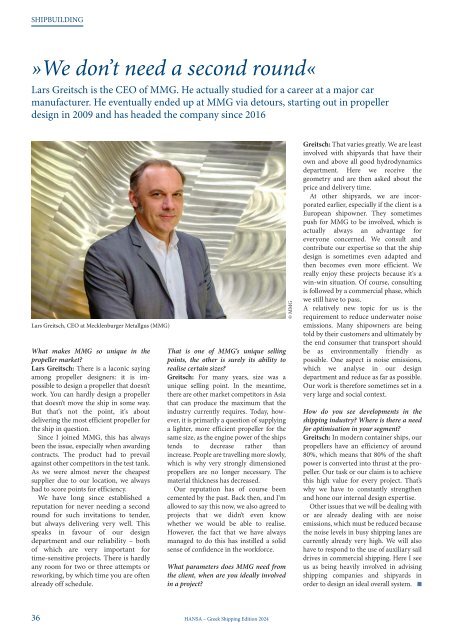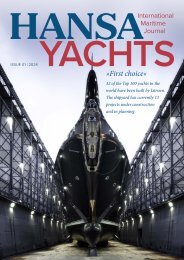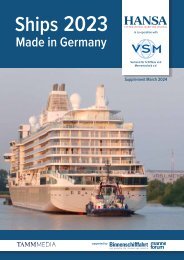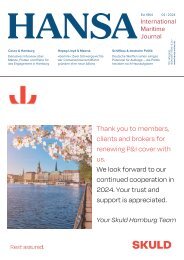HANSA Greek Shipping 2024 Posidonia Edition
SHIPPING: Greece in numbers / Interview Theodore Vokos, Managing Director, Posidonia Exhibitions / Interview Elias Kariambas, Vice President, Regional Business Development, Greece / Interview Michael Suhr, Senior Vice President and Regional Director North Europe at Korean Register (KR) / Greek shipowners on the way to Net Zero / Greek company’s strong in Capesize sector / Personal support as a USP SHIPBUILDING: Welcome to Posidonia 2024 / Setting sail for success in Greek market / Interview Jörg Karthaus, Head of Sales, Pleiger Maschinenbau / A data driven crystal ball / LNG fuelled LCO2 carriers: going for growth / 75 years of MMG Propeller – an eventful success story / Interview Lars Greitsch, CEO at Mecklenburger Metallgus (MMG)
SHIPPING: Greece in numbers / Interview Theodore Vokos, Managing Director, Posidonia Exhibitions / Interview Elias Kariambas, Vice President,
Regional Business Development, Greece / Interview Michael Suhr, Senior Vice President and Regional Director North Europe at Korean Register (KR) / Greek shipowners on the way to Net Zero / Greek company’s strong in Capesize sector / Personal support as a USP
SHIPBUILDING: Welcome to Posidonia 2024 / Setting sail for success in Greek market / Interview Jörg Karthaus, Head of Sales, Pleiger Maschinenbau / A data driven crystal ball / LNG fuelled LCO2 carriers: going for growth / 75 years of MMG Propeller – an eventful success story / Interview Lars Greitsch, CEO at Mecklenburger Metallgus (MMG)
Create successful ePaper yourself
Turn your PDF publications into a flip-book with our unique Google optimized e-Paper software.
SHIPBUILDING<br />
»We don’t need a second round«<br />
Lars Greitsch is the CEO of MMG. He actually studied for a career at a major car<br />
manufacturer. He eventually ended up at MMG via detours, starting out in propeller<br />
design in 2009 and has headed the company since 2016<br />
Lars Greitsch, CEO at Mecklenburger Metallgus (MMG)<br />
What makes MMG so unique in the<br />
propeller market?<br />
Lars Greitsch: There is a laconic saying<br />
among propeller designers: it is im -<br />
possible to design a propeller that doesn‘t<br />
work. You can hardly design a propeller<br />
that doesn‘t move the ship in some way.<br />
But that‘s not the point, it‘s about<br />
delivering the most efficient propeller for<br />
the ship in question.<br />
Since I joined MMG, this has always<br />
been the issue, especially when awarding<br />
contracts. The product had to prevail<br />
against other competitors in the test tank.<br />
As we were almost never the cheapest<br />
supplier due to our location, we always<br />
had to score points for efficiency.<br />
We have long since established a<br />
reputation for never needing a second<br />
round for such invitations to tender,<br />
but always delivering very well. This<br />
speaks in favour of our design<br />
department and our reliability – both<br />
of which are very important for<br />
time-sensitive projects. There is hardly<br />
any room for two or three attempts or<br />
reworking, by which time you are often<br />
already off schedule.<br />
That is one of MMG‘s unique selling<br />
points, the other is surely its ability to<br />
realise certain sizes?<br />
Greitsch: For many years, size was a<br />
unique selling point. In the meantime,<br />
there are other market competitors in Asia<br />
that can produce the maximum that the<br />
industry currently requires. Today, however,<br />
it is primarily a question of supplying<br />
a lighter, more efficient propeller for the<br />
same size, as the engine power of the ships<br />
tends to decrease rather than<br />
increase. People are travelling more slowly,<br />
which is why very strongly dimensioned<br />
propellers are no longer necessary. The<br />
material thickness has decreased.<br />
Our reputation has of course been<br />
cemented by the past. Back then, and I‘m<br />
allowed to say this now, we also agreed to<br />
projects that we didn‘t even know<br />
whether we would be able to realise.<br />
However, the fact that we have always<br />
managed to do this has instilled a solid<br />
sense of confidence in the workforce.<br />
What parameters does MMG need from<br />
the client, when are you ideally involved<br />
in a project?<br />
© MMG<br />
Greitsch: That varies greatly. We are least<br />
involved with shipyards that have their<br />
own and above all good hydrodynamics<br />
department. Here we receive the<br />
geometry and are then asked about the<br />
price and delivery time.<br />
At other shipyards, we are incorporated<br />
earlier, especially if the client is a<br />
European shipowner. They sometimes<br />
push for MMG to be involved, which is<br />
actually always an advantage for<br />
everyone concerned. We consult and<br />
contribute our expertise so that the ship<br />
design is sometimes even adapted and<br />
then becomes even more efficient. We<br />
really enjoy these projects because it‘s a<br />
win-win situation. Of course, consulting<br />
is followed by a commercial phase, which<br />
we still have to pass.<br />
A relatively new topic for us is the<br />
requirement to reduce underwater noise<br />
emissions. Many shipowners are being<br />
told by their customers and ultimately by<br />
the end consumer that transport should<br />
be as environmentally friendly as<br />
possible. One aspect is noise emissions,<br />
which we analyse in our design<br />
department and reduce as far as possible.<br />
Our work is therefore sometimes set in a<br />
very large and social context.<br />
How do you see developments in the<br />
shipping industry? Where is there a need<br />
for optimisation in your segment?<br />
Greitsch: In modern container ships, our<br />
propellers have an efficiency of around<br />
80%, which means that 80% of the shaft<br />
power is converted into thrust at the propeller.<br />
Our task or our claim is to achieve<br />
this high value for every project. That’s<br />
why we have to constantly strengthen<br />
and hone our internal design expertise.<br />
Other issues that we will be dealing with<br />
or are already dealing with are noise<br />
emissions, which must be reduced because<br />
the noise levels in busy shipping lanes are<br />
currently already very high. We will also<br />
have to respond to the use of auxiliary sail<br />
drives in commercial shipping. Here I see<br />
us as being heavily involved in advising<br />
shipping companies and shipyards in<br />
order to design an ideal overall system. ■<br />
36 <strong>HANSA</strong> – <strong>Greek</strong> <strong>Shipping</strong> <strong>Edition</strong> <strong>2024</strong>

















